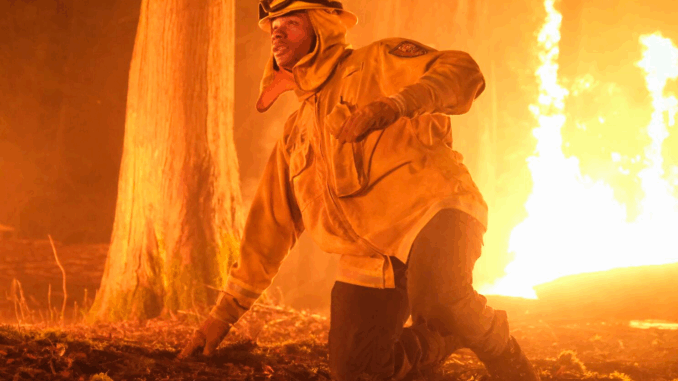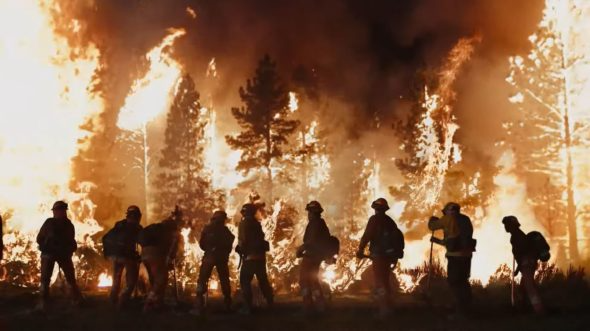
CBS’s fiery hit doesn’t just ignite forests — it ignites hearts, asking whether a person can ever truly be forgiven.
A Series Built on Broken Pasts
At its core, Fire Country isn’t just about firefighters or wildfires. It’s about redemption — the kind earned in sweat, tears, and sacrifice. The protagonist, Bode Donovan, is not a hero in the traditional sense. He’s a convicted felon, battling the weight of past mistakes while desperately trying to prove he deserves a second chance.
This theme of redemption is the show’s emotional backbone. Every character — from Bode to Vince, Sharon, Gabriela, and Jake — is grappling with their own version of regret, guilt, or failure. And in a world where fire is always coming, their personal reckonings feel all the more urgent.
Bode Donovan: The Embodiment of Redemption’s Complexity
Bode is not your typical TV firefighter. He’s a man haunted by a tragic past — the car crash that killed his sister — and fueled by an unrelenting desire to atone. His journey through the Conservation Camp Program is more than physical labor. It’s spiritual. Every fire he fights is a symbolic confrontation with the past.
But the show wisely avoids easy answers. Bode’s road to redemption is anything but smooth. He often sabotages himself, questions his worth, and struggles to reconnect with his estranged family. Fire Country paints redemption as an ongoing battle, not a moment of clarity or forgiveness.
In doing so, it gives viewers a nuanced portrait of a man who’s not always likable, but always human.
The Fireline as Penance
There’s something inherently poetic about Bode and other inmates fighting literal fire to metaphorically cleanse their souls. The fireline becomes a kind of penance, a brutal place where men try to prove they’re more than the sum of their charges.
What’s powerful about Fire Country is how it juxtaposes this with societal skepticism. The townspeople of Edgewater aren’t quick to forgive. Sharon and Vince themselves struggle with their son’s return. Even Gabriela, who sees the good in Bode, often questions whether he can outrun his demons.
This dynamic shows how redemption isn’t only internal — it’s also social. It requires others to accept your change, and that is never guaranteed.
Redemption Isn’t Just for Bode

While Bode is the focal point, Fire Country smartly extends the redemption arc to other characters:
-
Jake Crawford wrestles with guilt over his role in Riley’s death and his failed relationship with Gabriela. He’s not a criminal, but he’s also seeking to become a better man.
-
Manny Perez, the captain of the inmate crew and Gabriela’s father, faces addiction recovery and past failings as a father. His journey is one of leadership, vulnerability, and accountability.
-
Eve Edwards, often the emotional glue of the team, hides scars from a past relationship and the psychological toll of constant danger.
These subplots remind us that redemption isn’t exclusive to convicts. It’s something everyone seeks at some point — a second chance, a clean slate, a way forward.
Systemic Challenges to Forgiveness
While Fire Country personalizes redemption, it also critiques the systems that make it difficult. The Conservation Camp Program gives inmates an opportunity to contribute, but society is reluctant to reward their efforts. Ex-cons often face obstacles to employment, housing, and reentry.
Bode’s dream of becoming a firefighter outside prison is met with legal barriers. His fellow inmates may die in the line of duty and still be denied basic rights. The show uses these contradictions to highlight how we demand people change but rarely offer the support to help them do it.
By portraying these realities, Fire Country adds weight to its emotional arcs. It says: redemption is real — but it requires more than just personal growth. It requires a system that believes in rehabilitation, not just punishment.
The Role of Family and Community in Second Chances
Family dynamics are central to Fire Country. Vince and Sharon struggle with loving a son who reminds them of their greatest loss. Sharon, in particular, represents a mother’s conflict: wanting to believe in her son, but fearing disappointment again.
This tension plays out beautifully in scenes where Sharon advocates for Bode even as she hides her health issues, or when Vince’s cold exterior masks deep pain. Their journey shows how families must often forgive without forgetting, and how love alone isn’t always enough to heal trauma.
The town of Edgewater acts as a microcosm of American communities that resist reintegration. Their suspicion, their judgment, their collective memory — all these forces shape whether someone like Bode gets a real shot at a new life.
Is True Redemption Even Possible?
Perhaps Fire Country’s boldest move is not in affirming redemption, but in questioning it. Can you ever truly atone for the death of a sibling? Can you undo the pain you’ve caused a family? Can love survive betrayal?
The show doesn’t offer neat resolutions. Instead, it proposes that redemption is less about erasure and more about endurance. You live with your choices. You work to do better. You try — again and again.
And in that ongoing struggle, something like redemption can be found.
Conclusion: A Fire That Burns Inward
Fire Country is as much a story about inner fires as outer ones. It forces us to confront our own judgments about people who’ve made mistakes. It asks what we owe to those trying to change. And it challenges us to consider how many chances we would want — if it were us in the flames.
In a television landscape full of fast resolutions, Fire Country dares to let redemption burn slowly, painfully, and honestly.
And in that smoldering space, it finds its heart.
